Most Popular
Hello Hangeul
-
1
Welding book first in vocational Korean series for foreign labor
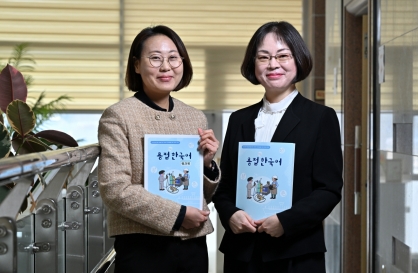
-
2
[Korea Beyond Korea] In Sao Paulo, horizons expand for Korean studies
![[Korea Beyond Korea] In Sao Paulo, horizons expand for Korean studies](//res.heraldm.com/phpwas/restmb_idxmake.php?idx=644&simg=/content/image/2023/11/20/20231120000619_0.jpg&u=20231206104853)
-
3
In Brasilia, worldly dreams are born from Korean classes
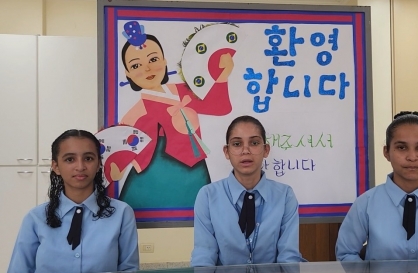
-
4
Americans seeking to visit Korea learn the language in LA
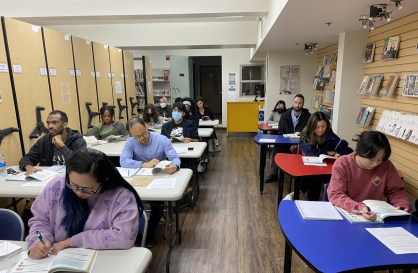
-
5
[Korea Beyond Korea] Berlin, Europe's Korean Studies hub, nurtures next-gen experts, scholars
![[Korea Beyond Korea] Berlin, Europe's Korean Studies hub, nurtures next-gen experts, scholars](//res.heraldm.com/phpwas/restmb_idxmake.php?idx=644&simg=/content/image/2023/10/18/20231018000929_0.jpg&u=20231023154735)
[Hello Hangeul] Korean language students in US barracks
Annual Korean speech contest for US soldiers stationed in S. Korea becomes a time-honored tradition
By Choi Jae-heePublished : April 30, 2023 - 13:38
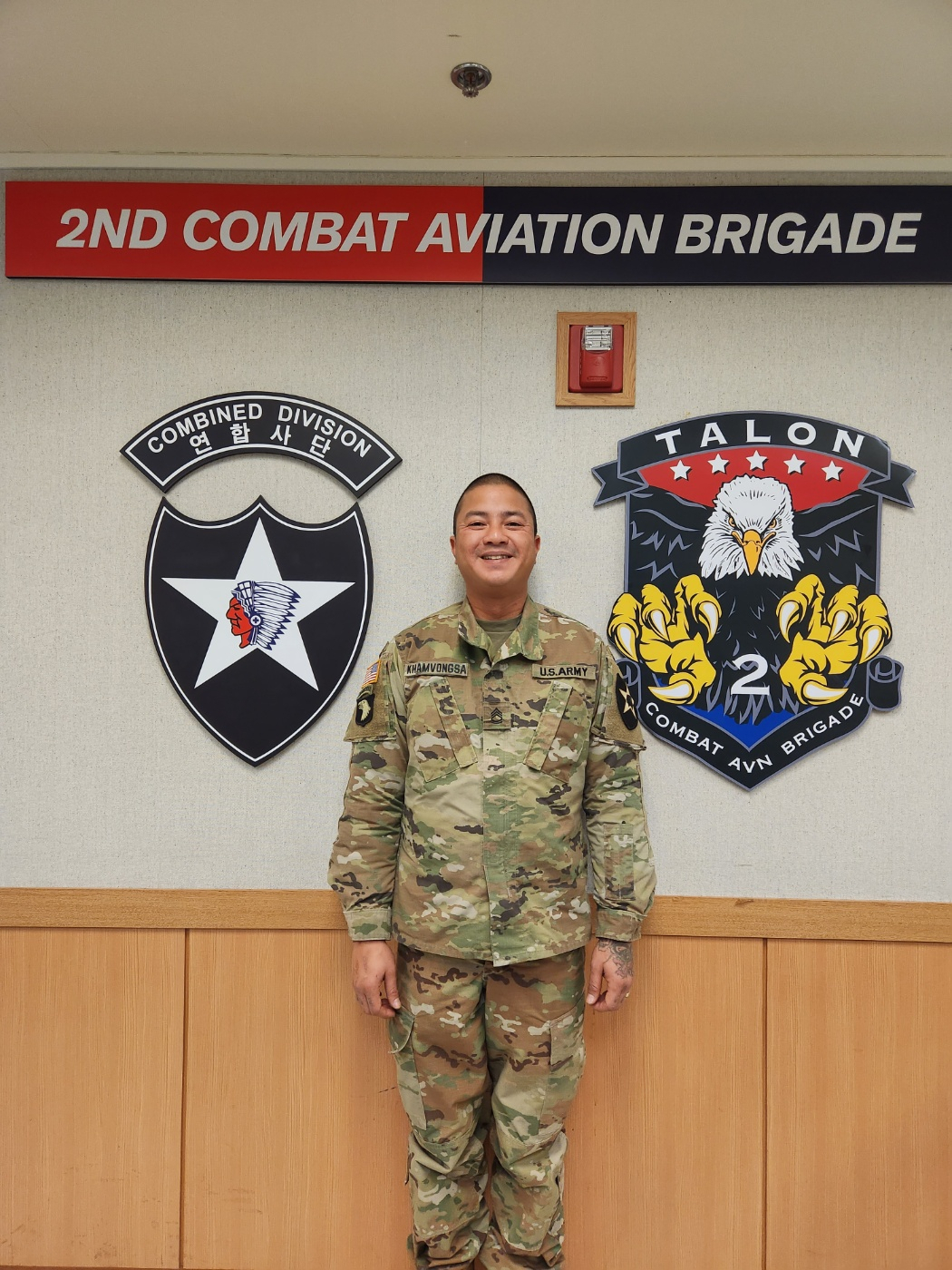
Sgt. 1st Class Joseph P. Khamvongsa arrived here in 2018 to be part of the US military forces stationed in South Korea.
Though not necessary for his job, he soon started taking Korean classes out of a desire to better understand the country he was helping to protect.
“I can’t forget the first time I had the combo of jokbal (pig's trotters) and soju with my Korean roommate, whom I met while serving at the ex-US military base site in Uijeongbu in the same year,” Khamvongsa told The Korea Herald.
“That’s when I decided to learn the Korean language to get to know more about Korea.”
Five years later, after hundreds of hours of online and offline classes, the American sergeant says he now understands almost 90 percent of what his native Korean friends are saying, though some Korean honorific terms and Chinese characters remain a challenge.
“I don’t feel that I am sufficiently fluent in Korean, but I can speak Korean enough to have daily conversations with Korean friends,” he said, referring to himself as an intermediate Korean learner.
Host country’s language, culture
There are about 28,500 American soldiers stationed in South Korea.
Like Khamvongsa, some of them have started studying the local language. Most take courses offered by local universities, while some opt for online lectures.
While there is no official language program offered by the bases, some provincial governments in South Korea, where US bases are located, do provide services for Korean language learners.
Since 2007, Gyeonggi Province has run Korean language classes on a yearly basis for US soldiers and their families with the goal of enhancing their understanding of Korea and to prevent possible conflict with the local community caused by language barriers.
The province is home to Camp Humphreys, which is the largest US military base outside of the US.
Last year, nearly 300 American servicemen stationed in Gyeonggi Province participated in the year-round Korean education program, which offers both language lessons and cultural experiences, including field trips to traditional markets, trying on Korean traditional attire and cooking Korean dishes.
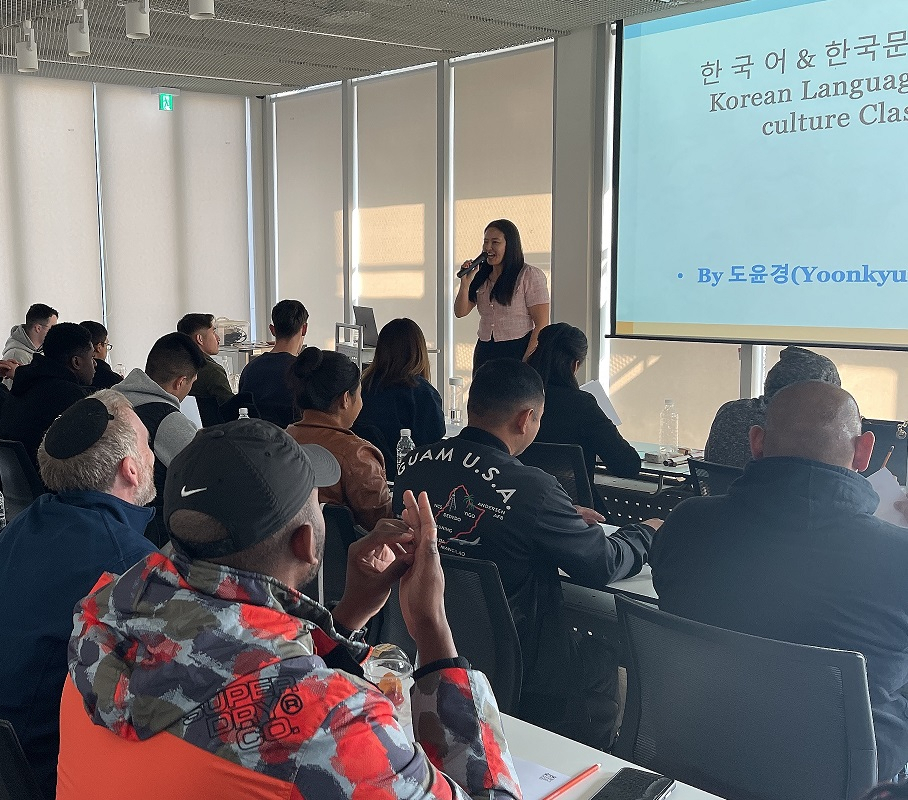
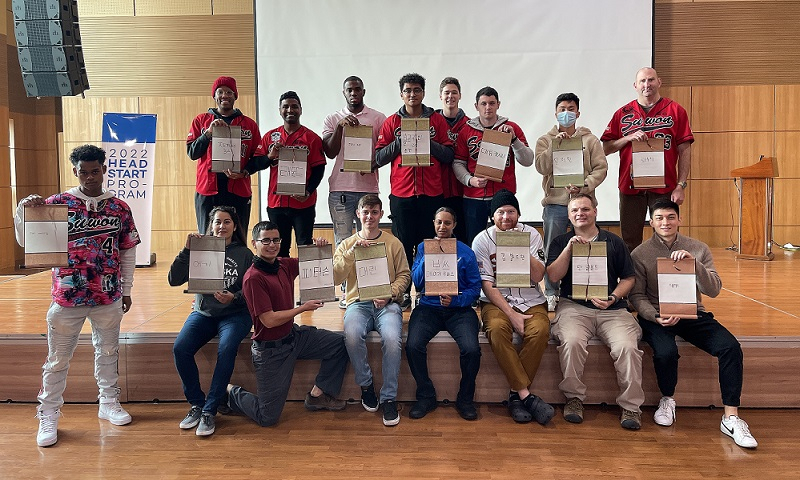
Annual speech contest
The annual speech contest is an important event for these uniformed learners of Korean.
The event has been held for over 20 years, jointly organized by the SOFA (Status of Forces Agreement) Support Center under South Korea’s Ministry of Foreign Affairs and the 8th Army ROKA Support Group.
The competition is open to any US soldier assigned to the 8th Army who does not specialize in Korean and who is not a Korean-American.
The latest installment of the contest, held on Sept. 22, had 27 entries in the preliminary round. Khamvongsa was one of the eight finalists. His three-minute speech was about memorable food experiences in Korea.
Other contestants talked about various Korean topics, including their first impression of the country, their feelings about the Korean military forces and the importance of the alliance between Seoul and Washington.
The symbolic slogan of the Korea-US alliance, "Katchi Kapshida," meaning we go together, was a popular catchphrase recited by many contestants.
Khamvongsa, who is married to a Korean and is considering retiring here, said he was impressed by some of the contestants who were on detached duty in Korea. “Even though they stay here for less than a year, they (are) eager to learn the Korean language.”
“I think it’s beneficial for American soldiers here to learn the Korean language, which is a window into Korean culture. It is a great way of showing respect to the locals we serve and (leaving) a good impression on this country,” he added.
Another participant in last year’s speech contest, who wished to remain anonymous, said “I used to have a difficult time communicating with Korean soldiers and employees at the military base, but now I can speak simple words and phrases in Korean.”






![[KH Explains] How should Korea adjust its trade defenses against Chinese EVs?](http://res.heraldm.com/phpwas/restmb_idxmake.php?idx=644&simg=/content/image/2024/04/15/20240415050562_0.jpg&u=20240415144419)






![[Korea Beyond Korea] In Sao Paulo, horizons expand for Korean studies](http://res.heraldm.com/phpwas/restmb_idxmake.php?idx=644&simg=/content/image/2023/11/20/20231120000619_0.jpg&u=20231206104853)


![[Korea Beyond Korea] Berlin, Europe's Korean Studies hub, nurtures next-gen experts, scholars](http://res.heraldm.com/phpwas/restmb_idxmake.php?idx=644&simg=/content/image/2023/10/18/20231018000929_0.jpg&u=20231023154735)







![[Today’s K-pop] Stray Kids to return soon: report](http://res.heraldm.com/phpwas/restmb_idxmake.php?idx=642&simg=/content/image/2024/04/16/20240416050713_0.jpg&u=)